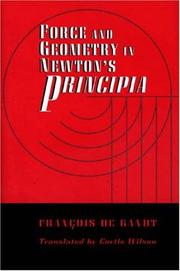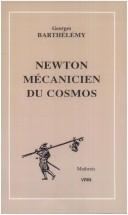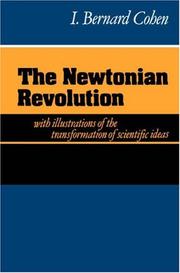| Listing 1 - 5 of 5 |
Sort by
|

ISBN: 0691033676 9780691033679 Year: 1995 Publisher: Princeton (N.J.) : Princeton university press,
Abstract | Keywords | Export | Availability | Bookmark
 Loading...
Loading...Choose an application
- Reference Manager
- EndNote
- RefWorks (Direct export to RefWorks)

ISSN: 11474920 ISBN: 2711611094 9782711611096 Year: 2002 Publisher: Paris : Librairie philosophique J. Vrin,
Abstract | Keywords | Export | Availability | Bookmark
 Loading...
Loading...Choose an application
- Reference Manager
- EndNote
- RefWorks (Direct export to RefWorks)
Philosophy of nature --- Newton, Isaac, --- Newton, Isaac, - 1642-1727 - Principia --- Gravitation. --- Mécanique analytique --- Mécanique céleste --- Histoire. --- Critique et interprétation. --- Newton, Isaac, 1642-1727 - Principia
Book
ISBN: 9782100493357 2100493353 Year: 2006 Publisher: Paris : Dunod,
Abstract | Keywords | Export | Availability | Bookmark
 Loading...
Loading...Choose an application
- Reference Manager
- EndNote
- RefWorks (Direct export to RefWorks)
Newton, Isaac (1642-1727). Principia --- Astronomie --- Mécanique --- Physique --- Sciences --- Gravitation --- Ouvrages avant 1800 --- Fondements --- Philosophie --- Histoire

ISBN: 0521229642 0521273803 0511665377 9780521229647 9780511665370 9780521273800 Year: 1980 Publisher: Cambridge Cambridge University Press
Abstract | Keywords | Export | Availability | Bookmark
 Loading...
Loading...Choose an application
- Reference Manager
- EndNote
- RefWorks (Direct export to RefWorks)
This volume presents Professor Cohen's original interpretation of the revolution that marked the beginnings of modern science and set Newtonian science as the model for the highest level of achievement in other branches of science. It shows that Newton developed a special kind of relation between abstract mathematical constructs and the physical systems that we observe in the world around us by means of experiment and critical observation. The heart of the radical Newtonian style is the construction on the mind of a mathematical system that has some features in common with the physical world; this system s then modified when the deductions and conclusions drawn from it are tested against the physical universe. Using this system Newton was able to make his revolutionary innovations in celestial mechanics and, ultimately, create a new physics of central forces and the law of universal gravitation. Building on his analysis of Newton's methodology, Professor Cohen explores the fine structure of revolutionary change and scientific creativity in general. This is done by developing the concept of scientific change as a series of transformations of ecxisting ideas. It is shown that such transformation is characteristic of many aspects of the sciences and that the concept of scientific change by transformation suggests a new way of examining the very nature of scientific creativity.
Physics --- Science --- Physique --- Sciences --- History --- Histoire --- Newton, Isaac, --- -Science --- -Natural science --- Science of science --- Natural philosophy --- Philosophy, Natural --- Physical sciences --- Dynamics --- Newton, Isaac Sir --- History. --- -History --- Arts and Humanities --- Physics - History --- Science - History --- Newton, Isaac, - 1642-1727. - Principia
Book
ISBN: 0387753664 9786613568847 1280390921 0387754776 Year: 2010 Publisher: New York, NY : Springer New York : Imprint: Springer,
Abstract | Keywords | Export | Availability | Bookmark
 Loading...
Loading...Choose an application
- Reference Manager
- EndNote
- RefWorks (Direct export to RefWorks)
In this third edition of Mathematica® in Action, award-winning author Stan Wagon guides beginner and veteran users alike through Mathematica's powerful tools for mathematical exploration. The transition to Mathematica 7 is made smooth with plenty of examples and case studies that utilize Mathematica's newest tools, such as dynamic manipulations and adaptive three-dimensional plotting. Mathematica in Action also emphasizes the breadth of Mathematica and the impressive results of combining techniques from different areas. This material enables the reader to use Mathematica to solve a variety of complex problems. Case studies ranging from elementary to sophisticated are provided throughout. Whenever possible, the book shows how Mathematica can be used to discover new things. Striking examples include the design of a road on which a square wheel bike can ride, the design of a drill that can drill square holes, an illustration of the Banach—Tarski Paradox via hyperbolic geometry, new and surprising formulas for p, the discovery of shadow orbits for chaotic systems, and the use of powerful new capabilities for three-dimensional graphics. Visualization is emphasized throughout, with finely crafted graphics in each chapter. Wagon is the author of eleven books on mathematics, including A Course in Computational Number Theory, named one of the ten best math books of 2000 by the American Library Association. He has written extensively on the educational applications of Mathematica, including the books VisualDSolve: Visualizing Differential Equations with Mathematica, and Animating Calculus: Mathematica Notebooks for the Laboratory. From reviews of the second edition: "In a dazzling range of examples Stan Wagon shows how such features as animation, 3-dimensional graphics and high-precision integer arithmetic can contribute to our understanding and enjoyment of mathematics." —Richard Walker, The Mathematical Gazette "The bottom line is that Mathematica in Action is an outstanding book containing many examples of real uses of Mathematica for the novice, intermediate, and expert user." —Mark McClure, Mathematica in Education and Research.
Newton, Isaac, 1642-1727. Principia. --- Mathematics --- Engineering & Applied Sciences --- Physical Sciences & Mathematics --- Computer Science --- Mathematics - General --- Data processing --- Data processing. --- Mathematica (Computer file) --- Mathematics. --- Applied mathematics. --- Engineering mathematics. --- Computer mathematics. --- Visualization. --- Computer software. --- Computational Mathematics and Numerical Analysis. --- Mathematical Software. --- Applications of Mathematics. --- Computer science --- Math --- Science --- Visualisation --- Imagination --- Visual perception --- Imagery (Psychology) --- Software, Computer --- Computer systems --- Computer mathematics --- Discrete mathematics --- Electronic data processing --- Engineering --- Engineering analysis --- Mathematical analysis
| Listing 1 - 5 of 5 |
Sort by
|

 Search
Search Feedback
Feedback About UniCat
About UniCat  Help
Help News
News